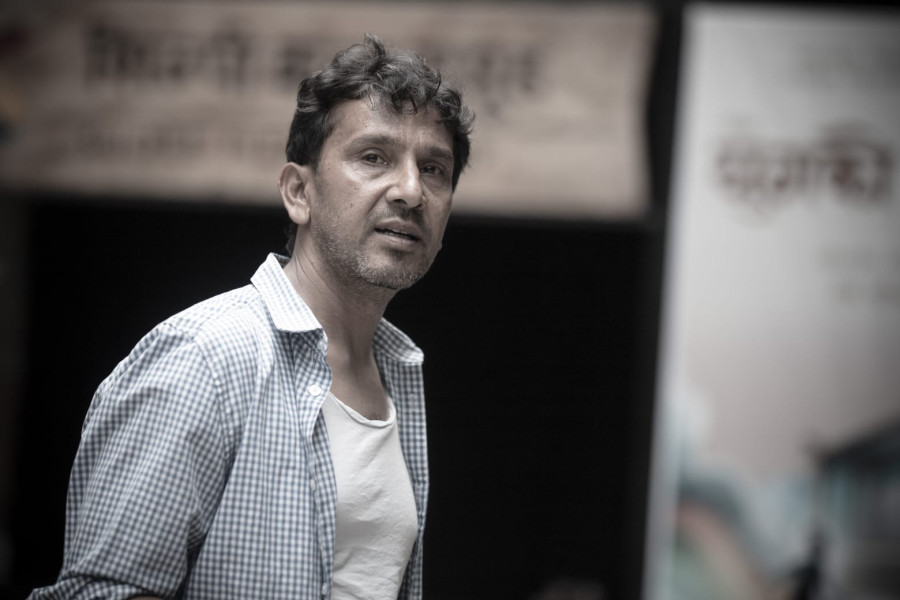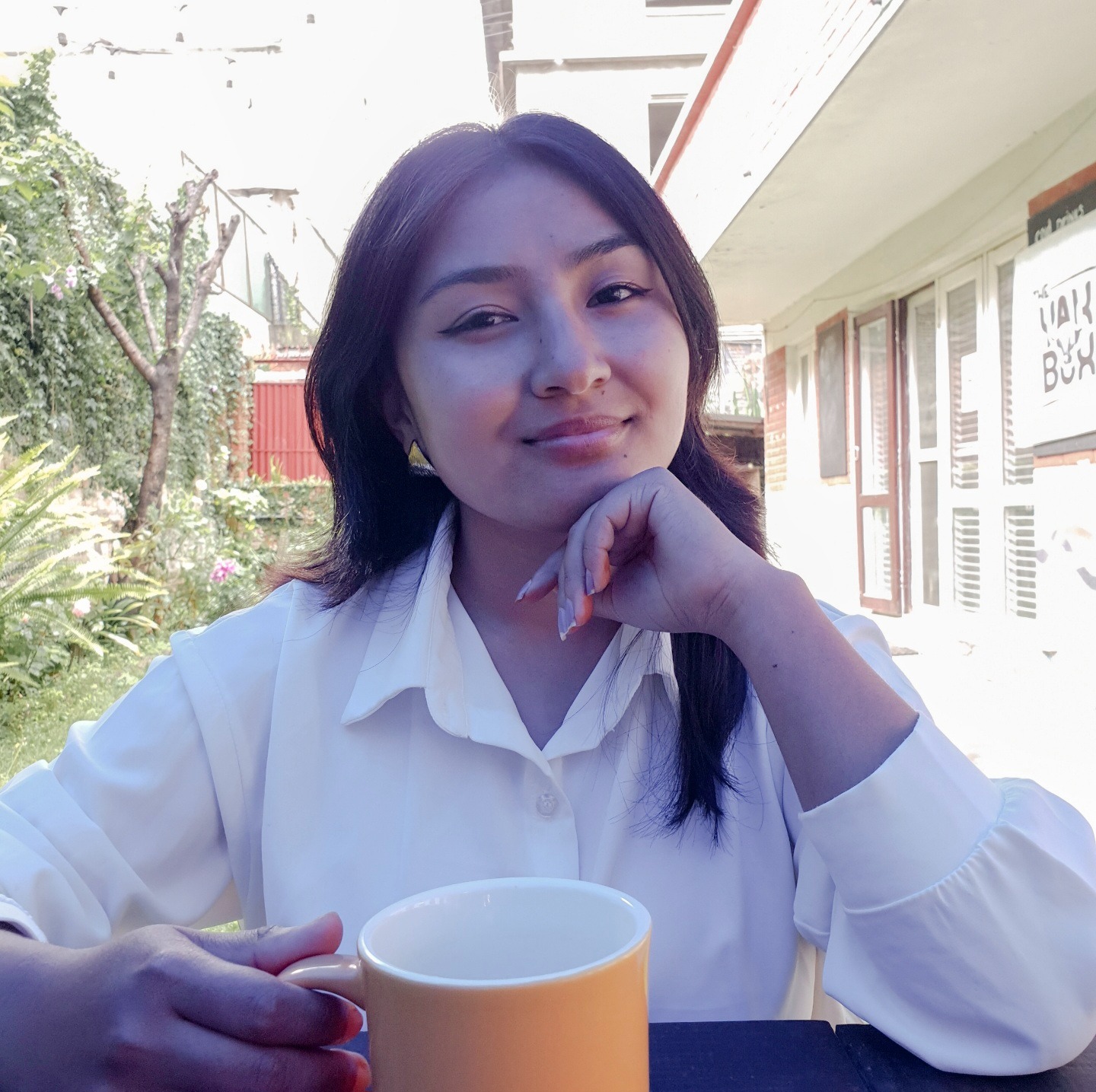Books
Blending literature and stagecraft
From founding Shilpee Theatre to directing and acting in numerous plays, Ghimire Yubaraj’s passion for literature has profoundly shaped his work in drama.
Timila Maharjan
Ghimire Yubaraj has been involved in the Nepali drama for over two decades. He is the founder and artistic director of Shilpee Theatre, Battisputali. He graduated from Commedia International Theatre School, Denmark, in 2011. Although he studied commerce in high school, he joined a year-long course in acting organised by Rastriya Nach Ghar and started his career in theatre.
He also published three books: ‘Bimokshya’, ‘Aandhi ko Manoram Nritya’ and ‘Rupantaran ka Laagi Rangamanch’. He has directed over two dozen dramas and acted in about one and a half dozen dramas.
In this conversation with the Post’s Timila Maharjan, Yubaraj explains how books and literature have helped him grow as a director and an actor.
How did you discover your love for books?
Since school, I’ve been passionate about fiction books, influenced by how my teachers brought folk stories and poetry to life. My father also played a role in my literary interests. He was a voracious reader of spy novels, which I didn’t find captivating, but he introduced me to Nepali literature.
At school, I studied works by authors like BP Koirala, Dhruba Sapkota, and Dhruba Chandra Gautam, which deepened my love for reading and writing. School literary activities further nurtured my interest.
I had access to more literary resources when I moved to Kathmandu for college. The Nepal-Bharat libraries offered free access to books, including Nepali literary magazines, contemporary literature, and academic texts. Reading became my escape, providing a peaceful retreat from everyday life.
Which books or authors have had a significant impact on your work? Can you give an example of how a particular book shaped a production or a character you developed?
Different books and authors have shaped my literary journey at various stages of my life. I went through a phase where I was captivated by Indian dramas, especially those by Mohan Rakesh, like ‘Ashadh Ka Ek Din’ and ‘Aadhe Adhure’. Later, I became a Girish Karnad, Badal Sarkar, and Vijay Tendulkar fan. I even acted in Karnad’s ‘Yayati’ at Shilpee.
My interest then shifted to Shakespeare, though I found his language challenging. Studying Shakespeare’s works, such as ‘Macbeth’, ‘Hamlet’, ‘The Tempest’, ‘Richard III’, ‘As You Like It’, and ‘A Midsummer Night’s Dream’, in Denmark taught me the magic of poetic language.
Henrik Ibsen’s ‘A Doll’s House’ and ‘Hedda Gabler’ were crucial in understanding drama’s structure and social realism. I also enjoyed Anton Chekhov’s long plays, like ‘The Seagull’, ‘Three Sisters’, ‘Uncle Vanya’, and ‘The Cherry Orchard’, performing ‘Three Sisters’ at Shilpee.
Other influential works include ‘Jhaphal Satra’, ‘No Exit’, and ‘The Respectful Prostitute’. Albert Camus, Arthur Miller, and Tennessee Williams’ three-act plays also influenced my writing and perception.
Nepali writers like Laxmi Prasad Devkota, Bal Krishna Sama, Gopal Prasad Rimal, Parijat, and Shankar Lamichhane have greatly influenced me. I have a special attachment to Parijat’s novel ‘Sirish Ko Phool’ and her other works, and I visited Burma to reflect on her writings. I also admire Nayan Raj Pandey and Kumar Nagarkoti’s recent works.
Additionally, I appreciate Nepali authors like Khagendra Sangraula, Narayan Wagle, and Archana Thapa, as well as George Orwell, especially his dramas ‘Burmese Days’, ‘Animal Farm’, ‘1984’, and his essay ‘Shooting an Elephant’.
Do you have a routine or specific time set aside for reading, or is it spontaneous?
I don’t have a fixed reading schedule, but I prefer reading in my home library. I’ll read in bed or in the bathroom if that's uncomfortable. I need a quiet, personal space to avoid distractions, as interruptions make it hard for me to concentrate, and I often have to start over.
How do books impact your process when creating new plays or performances?
For me, study and writing are gateways to the creative world. Even when I'm not actively creating, they provide an escape from daily life. I can't write, direct, or act without diverse experiences. I need a solid understanding of the subject I'm working on, or else the process becomes a struggle, like trying to start a fire with damp wood. Literature from various writers broadens my perspective, introducing me to different environments, characters, cultures, and thought processes. It also pushes my imagination beyond clichés.
You are also an author and have written books like Bimokshya, Aadhi ko Manoram Nritya and Rupantaran ka Laagi Rangamanch. So, what are the things that motivated you to write books?
Initially, I wrote poetry and stories out of curiosity and interest. However, writing has become a deeper desire over the past ten years, especially after working in theatre. I've performed in many plays by both national and international writers, but there's always been a gap, a desire for certain stories that led me to create my dramas.
Writing allows me to express emotions that acting and directing can’t fully convey. After experiencing various plays, reading books, and immersing myself in art and literature, different emotions—sometimes anger or pain—urge me to speak out. Writing gives me the freedom to express those feelings in unique ways. That's why I love writing.
Is there a particular book you return to time and again for inspiration or comfort?
I often revisit BP Koirala's books. I've read his biography thrice and think I'll read it again. Similarly, I've read ‘Hitler ra Yahudi’, ‘Sirish Ko Phool’, and ‘The Moving Body’ by Jacques Lecoq multiple times and always return to them. I also frequently read Peter Brook's works.
Ghimire Yubaraj’s book recommendations
The Hour We Knew Nothing of Each Other
Author: Peter Handke
Publisher: Yale University Press
Year: 1989
Handke’s postmodern play has over 300 characters, and they keep changing or shifting throughout the performance.
No Exit
Author: Jean-Paul Sartre
Publisher: Samuel French Inc
Year: 1944
This amazing book explores questions about human existence and shares the author's philosophical insights.
The Nordic Secret
Author: Lene Rachel Andersen and Tomas Bjorkman
Publisher: Fri Tanke
Year: 2017
This one highlights how knowledge contributed to Europe's social and physical development and showcases the peak use of science and technology.
Mero Kabita ko Aradhan
Author: Balkrishna Sama
Publisher: Sajha Prakashan
Year: 1972
This book is an honest memoir by Natya Siromani Bal Krishna Sama and serves as a great example of memoir writing.
Hitler ra Yahudi
Author: BP Koirala
Publisher: Sajha Prakashan
Year: 1958
Koirala offers a fresh perspective on war, using language I admire. This work of fiction explains the Second World War and Hitler’s history.




 15.87°C Kathmandu
15.87°C Kathmandu










